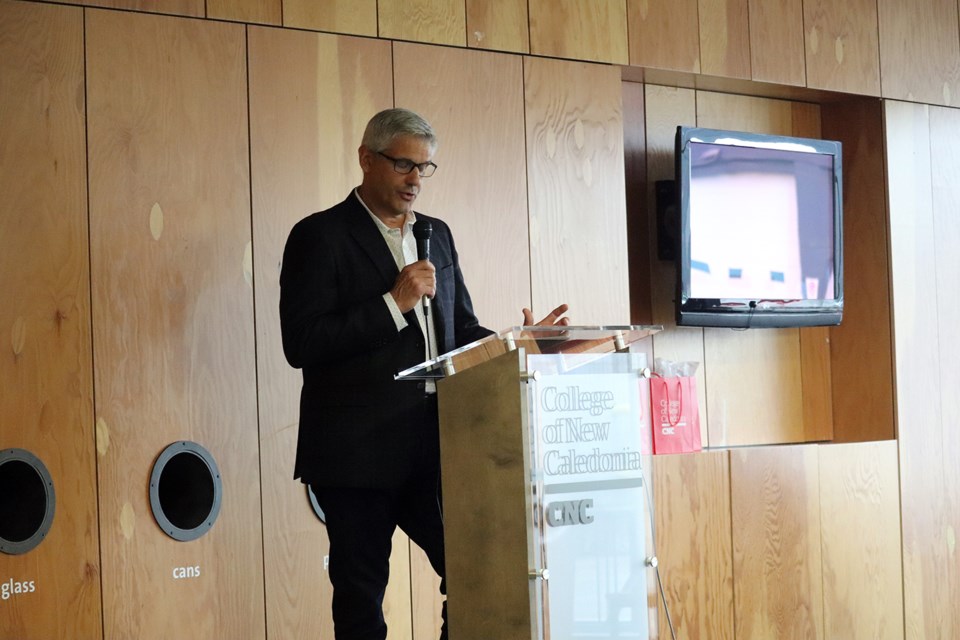Pat Weir lived a busy life on the go, but after experiencing a brain injury in 2005 and the loss of his hearing, he felt depressed and directionless in life.
He is now beginning a new career in trades, thanks to a first-of-its-kind pilot program at the College of New Caledonia (CNC), and in all of B.C., focuses on providing new opportunities for those living with brain injuries.
“I had a background in housing construction and because of my brain injury I wasn’t able to continue in that industry and I had no sense of direction,” said Weir. “I thought I was done as far as work but coming here and going through this program has shown me that I can contribute.”
The Trades Exploration Program in Prince George was developed to help underemployed and unemployed individuals with brain injuries explore trades occupations.
Students can pursue careers as a carpenter, automotive service technician, and professional cook as well as gain the skills needed to obtain entry into those industries.
“My confidence was pretty low and I was actually depressed before this program, but going through it has given me back that confidence and It’s overwhelming,” says Weir. “I have purpose and I have direction now when before I was lost.”
Weir is one of eight individuals from the northern interior are participating in the program at CNC.
Born through a collaborative effort
The program started in March, and by the end of June, students will have completed 60 hours in each of the carpentry, automotive service technician, and professional cooking classes as well as obtained first aid and food safe certifications.
The program also provides free tuition, books, and work clothing and personal protective equipment and includes additional supports, such as an in-class coordinator, daily meals, and transit to and from school.
“I think I may have learned more than them they did from me,” says Ken Rowell, CNC’s Automotive Service Instructor, who taught in the program. “I’ve had a much clearer understanding of the brain and how to diversify my methods of instruction so I think I’ve learned a lot.”
The program itself was born through collaboration and partnership with the Industry Training Authority (ITA), Prince George Brain Injured Group (PGBIG), Prince George Nechako Aboriginal Employment and Training Association (PGNAETA), and CNC.
“We are committed to make trades more welcoming, safe, and diverse for everyone regardless of their barriers or challenges,” Rod Bianchini, ITA’s Interim Chief Operating Officer at CNC’s June 6 celebration of the program.
“I’d like to take a moment to acknowledge our senior leadership at ITA for believing in the concept of trades training programming for a group that has never before had the opportunity in B.C,” said Bianchini.
“Today, we celebrate the strength and fortitude of a group of individuals who have moved beyond perceived limitations towards opportunity and hope.”
Living with a brain injury
There are approximately 60 new cases of brain injury per day in B.C. and following the acute stage of recovery from the medical effects of an injury, survivors of brain injury are often left to pick up the pieces of their lives by themselves.
“One of the things that really attracted people to participating in this program was the fact that they were hopeful that this was the beginning of something new,” said Alison Hagreen, PGBIG executive director.
PGBIG also helped participants in the program with individual recovery plans, which included one-to-one case management, brain injury education classes and programs, and participation in employment-related programming.
“We are seeing big differences in the people who were in this program,” said Hagreen. “We have people who are ready, willing and able and who have the skills they need to succeed in the competitive employment industry. We are losing a whole pile of people by not training people with brain injuries specifically for jobs."
As for what’s next for Weir now that the program is wrapping up, he says he’s going to continue his education and pursue a career in the automotive industry.
“I’m going to continue my education and go into the trades in automotive because I enjoy it and I like working with my hands,” says Weir, adding “There’s a lot of people that need this program and I’m honoured to be a part of it.”
Once the program officially finishes up later this month, PGBIG will follow up with participants and support them as they seek work in the community.



